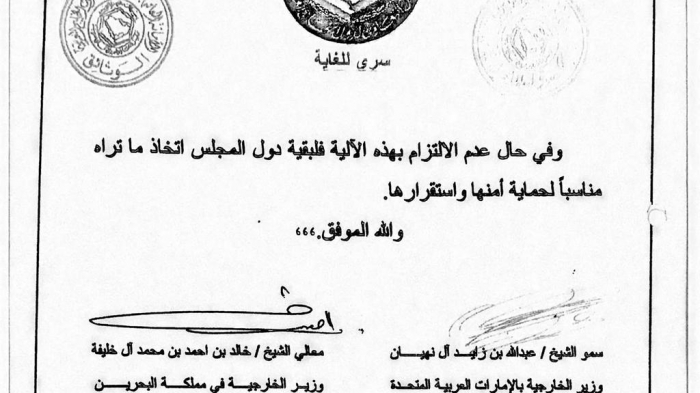Soon after the documents obtained by CNN were made public on Monday, the four countries affirmed that they showed "beyond any doubt Qatar's failure to meet its commitments and its full violation of its pledges".
They said the 13 demands submitted to the Qatar government last month were stated in the previous agreements and "fully in line with the spirit of what was agreed upon", according to a statement reported on the state news agency WAM.
While it was widely known Qatar had previously committed to halt actions that would undermine the stability of the Arabian Gulf, including its support of the Muslim Brotherhood and extremist groups, this is the first time the documents laying out the promises have been seen publicly.
The documents, signed by Qatar and other GCC members, states: “In case there is a failure to work within the agreed framework, the rest of the GCC can take what steps are necessary to protect its security and stability.”
The first document dated November 2013, which was hand-written in Arabic after a meeting between the late Saudi ruler, King Abdullah, the Emir of Kuwait, Sheikh Sabah and the Emir of Qatar, Sheikh Tamim.
The paper said the three leaders “held extensive deliberations in which they conducted a full revision of what taints the relations between the [Gulf Cooperation] Council states, the challenges facing its security and stability, and means to abolish whatever muddies the relations”.
They decided on a new phase “of collective work between the Council’s states”, which rested on three main principles.
Firstly, not interfering in the internal affairs of other GCC members, not giving refuge to any individual or group opposing another member state and no support for “antagonistic media”, Secondly: “No support to the Muslim Brotherhood or any of the organisations, groups or individuals that threaten the security and stability of the Council states.” The third principle which was signed stated members would not support “any faction in Yemen that could pose a threat to countries neighbouring Yemen”.
On November 16, 2014, the six foreign ministers of the GCC signed a second agreement fleshing out what was agreed in 2013 and giving further detail.
The statement, this time typed on letter-headed paper, with the seal of the GCC and “Top Secret” written underneath.
It included further emphasis on a commitment by all sides to “maintain the collective direction of the countries of the GCC” when it comes to foreign policy.
The document specifies “not supporting the Muslim Brotherhood financially or through media platforms, whether in the GCC or abroad’, in addition to “an agreement on the departure of a group of Muslim Brotherhood figures who are not citizens and within a set duration” to be agreed upon.
Since the agreement, Qatar has continued to host and support members from the Muslim Brotherhood and provided them with strong media platforms.
There was an added commitment to stop “backing groups that represent a threat to the security and stability of GCC countries, whether in Yemen or in Syria or in other areas of conflict”. Here again, Qatar continued to support extremist groups like Jabhat Al Nusra, which is an affiliate of Al Qaeda and an internationally designated terrorist organisation.
In a third document signed by the leaders of the six GCC countries, also on November 16, 2014, in Riyadh, a clear understanding was reached by all sides.
The document, also stamped “Top Secret”, states that “a non commitment to any article of the Riyadh agreement, and its implementation framework, will be considered a complete break of what is stated” in the two documents. It was agreed that there would be full compliance within a month.
Saudi Arabia, the UAE, and Bahrain, all signatories to the agreement and now boycotting Qatar. They say the leadership in Doha has repeatedly failed to meet its obligations.
One key component of the agreement was for all GCC countries to support “Egypt and to participate in its security and stability and to contribute to its financial support”. The agreement added that countries should stop all media activity targeting Egypt including from Qatar’s Al Jazeera channels.
The documents were leaked shortly after US secretary of state Rex Tillerson landed in Kuwait on Monday night in the first major American push to broker a resolution to the Qatar crisis.
The US diplomat will visit the UAE, Saudi Arabia and Qatar after a meeting with Kuwait’s top officials.
While no fixed schedule has been announced, Mr Tillerson plans to stay in Kuwait until Thursday.
Kuwait has served as chief mediator in the Gulf crisis, with its emir visiting his counterparts in the quartet of Arab countries boycotting Qatar.
More about: #Qatar #TOPSECRET
















































